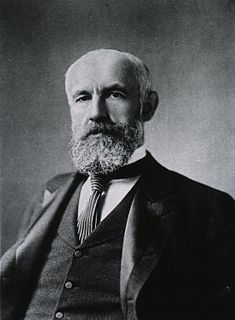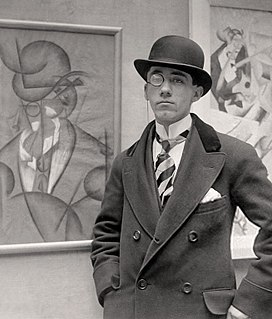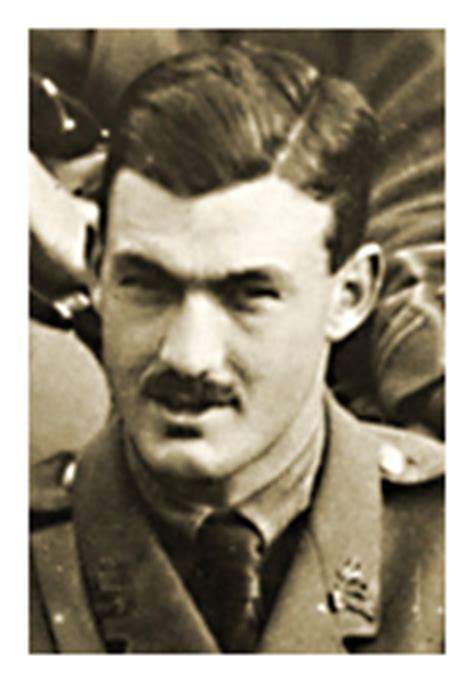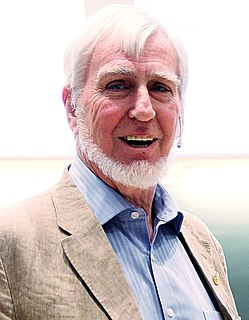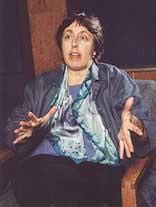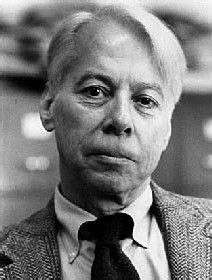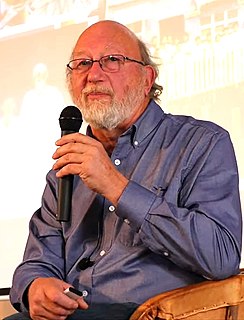Top 92 Cognition Quotes & Sayings - Page 2
Explore popular Cognition quotes.
Last updated on April 15, 2025.
Faith is the commitment of one's consciousness to beliefs for which one has no sensory evidence or rational proof. When man rejects reason as his standard of judgement, only one alternative standard remains to him: his feelings. A mystic is a man who treats his feelings as tools of cognition. Faith is the equation of feelings with knowledge
All possible truth is practical. To ask whether our conception of chair or table corresponds to the real chair or table apart from the uses to which they may be put, is as utterly meaningless and vain as to inquire whether a musical tone is red or yellow. No other conceivable relation than this between ideas and things can exist. The unknowable is what I cannot react upon. The active part of our nature is not only an essential part of cognition itself, but it always has a voice in determining what shall be believed and what rejected.
Autism reaches out in many different directions. It can be associated with language delays. It can be associated with epilepsy. It can be associated with some degree of intellectual disability, but the two core features of autism, I see, is impairments and social cognition, understanding and in restricted interests and repetitive behaviors.
Machines taking over jobs - it's the history of civilization. Replacing farm animals, old forms of manual labor, now taking over small, menial aspects of cognition. But there's still plenty of room for creativity, for curiosity - many things that are related to passion, like art. But also, things about human communication and challenges, massive challenges that we left behind because we didn't want to take so much risk, such as space exploration, deep ocean exploration.
The emergence of a unified cognitive moment relies on the coordination of scattered mosaics of functionally specialized brain regions. Here we review the mechanisms of large-scale integration that counterbalance the distributed anatomical and functional organization of brain activity to enable the emergence of coherent behaviour and cognition. Although the mechanisms involved in large-scale integration are still largely unknown, we argue that the most plausible candidate is the formation of dynamic links mediated by synchrony over multiple frequency bands.
In the early days the Cubism' method of grasping an object was to go round and round it. The Futurists declared that one had to get inside it. In my opinion the two views can be reconciled in a poetic cognition of the world. But to the very fact that they appealed to the creative depths in the painter by awakening in him hidden forces which were intuitive and vitalizing, the Futurist theories did more than the Cubist principles to open up unexplored and boundless horizons.
Whenever humanity seems condemned to heaviness, I think I should fly like Perseus into a different space. I don't mean escaping into dreams or into the irrational. I mean that I have to change my approach, look at the world from a different perspective, with a different logic and with fresh methods of cognition and verification.
Since consciousness is the basis of all reality, any shift in consciousness changes every aspect of our reality. Reality is created by consciousness differentiating into cognition, moods, emotions, perceptions, behavior, speech, social interactions, environment, interaction with the forces of nature, and biology. As consciousness evolves, these different aspects of consciousness also change.
Diversity and independence are important because the best collective decisions are the product of disagreement and contest, not consensus or compromising. An intelligent group, especially when confronted with cognition problems, does not ask its members to modify their positions in order to let the group reach a decision everyone can be happy with. Instead…the best way for a group to be smart is for each person in it to think and act as independently as possible.
While, on the one hand, the end of scientific investigation is the discovery of laws, on the other, science will have reached its highest goal when it shall have reduced ultimate laws to one or two, the necessity of which lies outside the sphere of our cognition. These ultimate laws-in the domain of physical science at least-will be the dynamical laws of the relations of matter to number, space, and time. The ultimate data will be number, matter, space, and time themselves. When these relations shall be known, all physical phenomena will be a branch of pure mathematics.
The naturalist is a civilized hunter. He goes alone into the field or woodland and closes his mind to everything but that time and place, so that life around him presses in on all the senses and small details grow in significance. He begins the scanning search for which cognition was engineered. His mind becomes unfocused, it focuses on everything, no longer directed toward any ordinary task or social pleasantry.
Industrial Society is not merely one containing 'industry,' large-scale productive units capable of supplying man's material needs in a way which can eliminate poverty: it is also a society in which knowledge plays a part wholly different from that which it played in earlier social forms, and which indeed possesses a quite different type of knowledge. Modern science is inconceivable outside an industrial society: but modern industrial society is equally inconceivable without modern science. Roughly, science is the mode of cognition of industrial society, and industry is the ecology of science.
Just as man's physical existence was liberated when he grasped that 'nature, to be commanded, must be obeyed', so his consciousness will be liberated when grasps that nature, to be apprehended, must be obeyed - that the rules of cognition must be derived from the nature of existence and the nature, the identity, of his cognitive faculty.
We have always dovetailed our cognition to our tools, but when our tools start dovetailing back, where do I end and where does the tool begin? It is going to be a really Twilight Zonish situation. It is definitely interesting. Once Google is in a blood cell sized device in our brain, do we become part Google? There are certainly interesting things to think about and provocative questions, but I don't think those provocative questions are going to do anything to slow down the onset of these technologies arriving and becoming even more pervasive.
Of all the things we are wrong about, error might well top the list ... We are wrong about what it means to be wrong. Far from being a sign of intellectual inferiority, the capacity to err is crucial to human cognition. Far from being a moral flaw, it is inextricable from some of our most humane and honourable qualities: empathy, optimism, imagination, conviction, and courage. And far from being a mark of indifference or intolerance, wrongness is a vital part of how we learn and change. Thanks to error, we can revise our understanding of ourselves and amend our ideas about the world.
There are two principles on which all men of intellectual integrity and good will can agree, as a 'basic minimum,' as a precondition of any discussion, co-operation or movement toward an intellectual Renaissance. . . . They are not axioms, but until a man has proved them to himself and has accepted them, he is not fit for an intellectual discussion. These two principles are: a. that emotions are not tools of cognition; b. that no man has the right to initiate the use of physical force against others.
There is, perhaps, one universal truth about all forms of human cognition: the ability to deal with knowledge is hugely exceeded by the potential knowledge contained in man's environment. To cope with this diversity, man's perception, his memory, and his thought processes early become governed by strategies for protecting his limited capacities from the confusion of overloading. We tend to perceive things schematically, for example, rather than in detail, or we represent a class of diverse things by some sort of averaged "typical instance.
Faculty Psychology is getting to be respectable again after centuries of hanging around with phrenologists and other dubious types. By faculty psychology I mean, roughly, the view that many fundamentally different kinds of psychological mechanisms must be postulated in order to explain the facts of mental life. Faculty psychology takes seriously the apparent heterogeneity of the mental and is impressed by such prima facie differences as between, say, sensation and perception, volition and cognition, learning and remembering, or language and thought.
Cognitive neuroscience is entering an exciting era in which new technologies and ideas are making it possible to study the neural basis of cognition, perception, memory and emotion at the level of networks of interacting neurons, the level at which we believe many of the important operations of the brain take place.
The first principle of cognitive therapy is that all your moods are created by your 'cognitions,' or thoughts. A cognition refers to the way you look at things - your perceptions, mental attitudes, and beliefs. It includes the way you interpret things - what you say. about something or someone to yourself.
I worry that the level of interrupt, the sort of overwhelming rapidity of information — and especially of stressful information — is in fact affecting cognition. It is in fact affecting deeper thinking. I still believe that sitting down and reading a book is the best way to really learn something.? And I worry that we’re losing that.
The pure mystic wishes to approach his God only in the all-embracing love. The yogi, too, walks toward one single aspect of God. The bhakti-yogi keeps to the road of love and devotion, the raja and hatha yogi choose the path of self-control or volition, the jnana yogi will follow that of wisdom and cognition.
Many abused children cling to the hope that growing up will bring escape and freedom. But the personality formed in an environment of coercive control is not well adapted to adult life. The survivor is left with fundamental problems in basic trust, autonomy, and initiative. She approaches the tasks of early adulthood-establishing independence and intimacy-burdened by major impairments in self-care, in cognition and memory, in identity, and in the capacity to form stable relationships. She is still a prisoner of her childhood; attempting to create a new life, she reencounters the trauma.
The issue Fodor writes about is central to the psychology of perception, cognition, and action. It is the central issue for anyone who would seriously study the neurobiology of behavior: Is the mind organized horizontally or vertically or both, and what are the consequences to psychology of proceeding on one assumption or the other? This has been little analyzed and written about. Jerry Fodor has repaired that omission and had done it brilliantly.
Chris Davis [of the Davisfunds] has a temple of shame. He celebrates the things they did that lost them a lot of money. What is also needed is a temple of shame squared for things you didn't do that would have made you rich. Forgetting your mistakes is a terrible error if you are trying to improve your cognition. Reality doesn't remind you. Why not celebrate stupidities in both categories?

